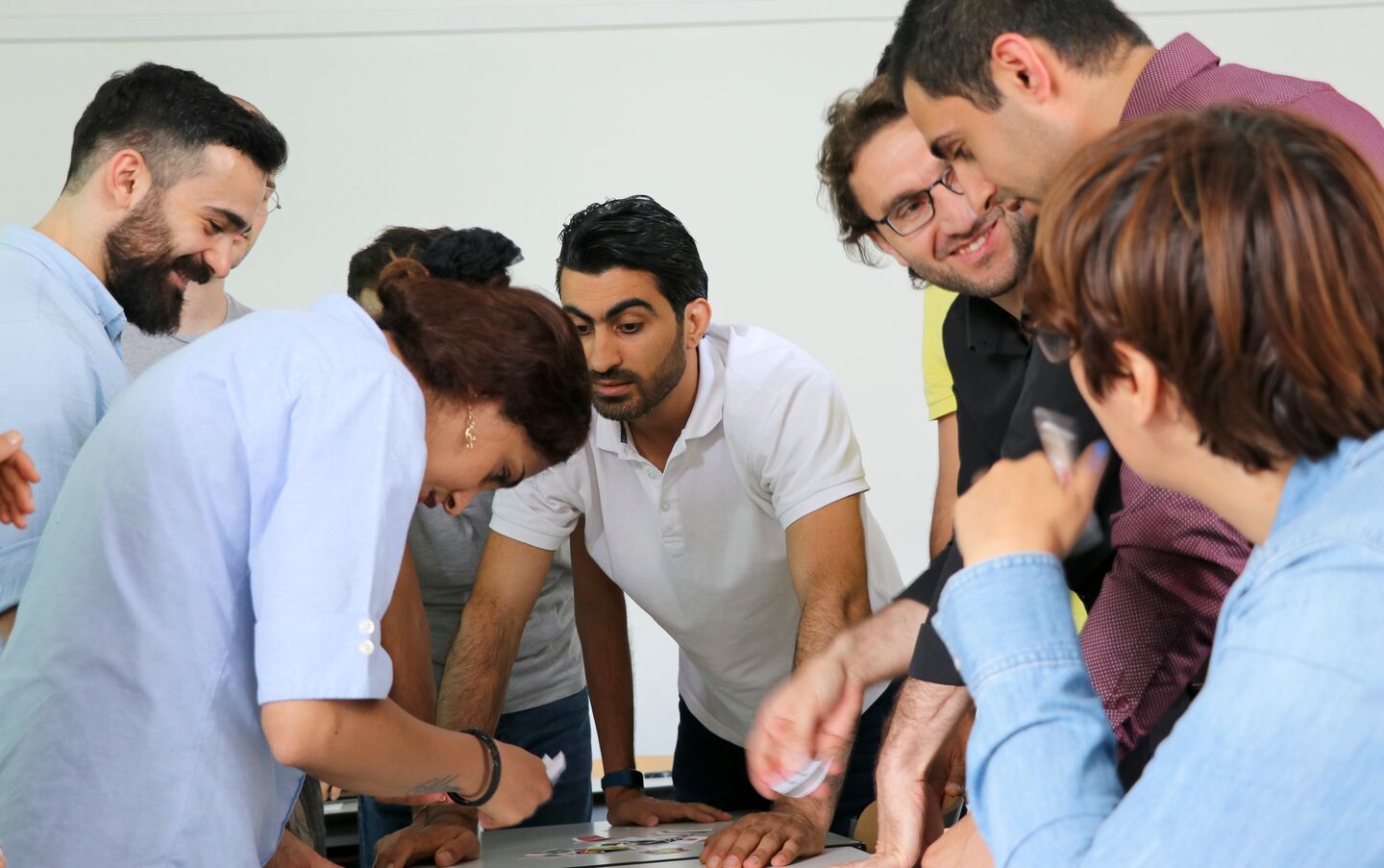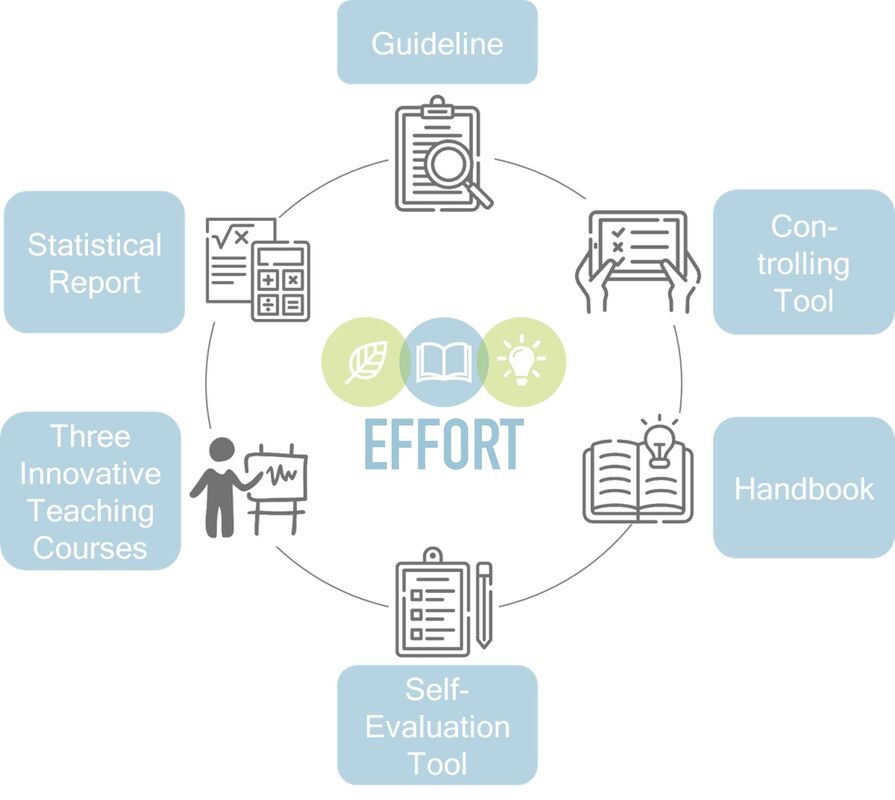EFFORT to Make Higher Education More Effective in Teaching
Sustainable development and responsibility are key to solving social and environmental problems. Higher Education is at the core of educating responsible future decision makers to change course. How?

Berlin, 18. November 2022. Representatives from the six European business schools and universities who together develop interrelated instruments to improve the effectiveness of teaching that targets buildings competencies related to sustainability and responsible management had a chance to present their research findings and conclusions at the UN Climate Change Conference (COP 27). The session was titled “Educate to a Sustainable Future”.
EFFectiveness Of Responsibility Teaching (EFFORT) aims at fostering awareness for Corporate Social Responsibility (CSR), changing attitudes and influencing the behaviour of individuals. The three-year international research project is co-funded by the ERASMUS+ Programme of the European Union, until the end of 2022. Member institutions are Berlin School of Economics and Law (HWR Berlin), Cologne Business School (CBS), University of Bari (UNIBA), University of the Basque Country (UPV/EHU), Lappeenranta-Lahti University of Technology (LUT University) and Budapest Business School (BGE).
As humans impact the physical environment in many negative ways for example through pollution, burning fossil fuels and deforestation which trigger climate change, soil erosion, poor air quality, and undrinkable water, it is up to humans to change course. Leaders, politicians and experts from more than 190 countries are currently gathering at the UN Climate Change Conference (COP 27) in Sharm el-Sheikh, Egypt. They discuss climate crisis on a global level in order to come up with solutions for tackling the most pressing challenges of our times.
Education is the foundation on which people’s behaviour can be altered. It lies in the responsibility of leaders moving pledges made to collectively turn the tide on yet ever more climate disasters happening on all continents into implementation. The United Nations Educational, Scientific and Cultural Organization (UNESCO) took up this idea by promoting concepts of “Education for Sustainable Development”. Higher Education Institutions (HEI) are of utmost importance in educating responsible future decision makers.
In an interview, Professor Dr Silke Bustamante, Vice President for Sustainability at the Hochschule für Wirtschaft und Recht Berlin (HWR Berlin) / Berlin School of Economics and Law who guides the project talked about the objectives of EFFORT and its first results.
Which role does higher education play in achieving the UN’s sustainable development goals?
Higher Education Institutions (HEI) play a crucial role in the transformation to sustainable economies. First, they may act as role models by operating their own institutions in a sustainable, responsible and ethical way. Second, they contribute with their research to knowledge development in the area of sustainability and responsibility. Third, and perhaps most importantly, HEI may enhance values, skills and competencies that allow students to take responsible decisions in their future roles as professionals as well as individuals.
Why is education in general an important if not to say key aspect of social responsibility?
Education is able to act on three levels: Creating awareness of sustainability challenges and hereby emphasizing urgency to act. Secondly, it can motivate individuals to contribute by inciting a reflection about values and attitudes. It also enables individuals to act by fostering competencies that are necessary for acting sustainably.
What motivated the six European partner institutions to make an EFFORT enhancing the quality and effectiveness of their teaching in areas such as sustainability, CSR, and business ethics?
The motivation came from a prior project in which we investigated the importance of CSR for employer choice. By means of an adapted conjoint analysis, we observed that most aspects of socio-ecological responsibility are – compared to other employer attributes – not important to young job seekers. This observation is true even if young people have participated in classes about sustainability, ethics or CSR beforehand. This made us question the effectiveness of sustainability related teaching and led to the proposal for this project.
Who are you aiming at when enhancing the “EFFectiveness Of Responsibility Teaching” and what are the main goals?
Our target groups are other lecturers, university staff responsible for course development, university management, but also NGOs, political actors and other actors who are involved in Education for Sustainability.

How do you define and measure teaching effectiveness?
Teaching is effective when it empowers students to act also in complex situations in a sustainable manner to ‘achieve environmental integrity, economic viability and a just society, for present and future generations, while respecting cultural diversity’, as the UNESCO defined their goals of Education for Sustainable Development (ESD). Students should become ‘sustainability change-makers’, contributing to the attainment of UNESCO’s 17 Sustainable Development Goals. We developed a controlling tool, which works as a pre-post measurement based on a behavioral model.
Why does it take innovative teaching formats to reach out to people and influence their thinking and behaviour?
Simply because classical teaching seems to be inappropriate to do just that.
Could you give an example for an innovative teaching format you developed?
Our group came up with three innovative teaching formats. To elaborate on one specifically, we focused on enhancing the engagement for responsibility. It intends to create awareness for sustainability related problems, make students to question their values and behaviours and enable and motivate them to contribute to a more sustainable world. It is taught within the second year of a cooperative Bachelor’s programme in Business Administration where students already have experience in working for a company. Within the course, student teams consisting of four to five persons work on a real-life challenge brought in by an external partner, a company or NGO.
Challenges are designed in a way, that they refer to sustainability issues and aim at contributing to selected sustainable development goals. The methodology for working on the challenge is service design. This is suitable to solve so-called ‘wicked problems’ and is increasingly used for facilitating social innovation and sustainable business model innovation. The two lecturers work as a team. One lecturer is facilitating the service design process, while the other lecturer provides short inputs on sustainability, sustainable development, ethics, civil engagement and corporate responsibility and makes students reflect on their own responsibility and possibilities to contribute to the SDGs. Reflection tasks, beyond linking theoretical issues with project work, motivate students to question their beliefs and thoughts and think about their own role and capability to act responsibly.
Another method is the drafting of future scenarios for sustainable business solutions structured according to future workshop phases including preparation, critique, visioning, and implementation. Finally, the format in the category of Innovation and Technology for Sustainable Future. Hereby the main project is the creation of a film about a solution that the students identify.
Which are the major guidelines for sustainability and CSR teaching?
Based on our extensive research findings and first practical trials, we suggest to apply innovative pedagogies, such as experiential learning, service learning or a sustainability related consulting project, that are suitable to influence behavioural variables such as attitudes, affective reactions, moral obligation or subjective norms. It is necessary to control the effectiveness of teaching and reflect about what can be further improved, throughout.
In addition, other important aspects should be considered, that have an impact on teaching effectiveness, such as course design, like integrating sustainability into teaching objectives, and course management including giving feedback to students or acting as a role model. Moreover, one needs to take into account the importance of informal learning, which emphasized the need to integrate sustainability throughout the institution.
Professor Bustamante, thank you very much for taking the time to answer the questions.
The interview was conducted by Sylke Schumann, Press Spokeswoman of the HWR Berlin.